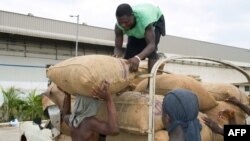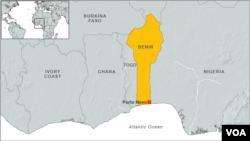As world leaders meet in Egypt to discuss ways to combat climate change, one possible solution is brewing across the continent in Benin. Benin has built an industrial park to move the country away from exporting raw materials to making finished products. If implemented on a larger scale, activists say, the trend would cut down on emissions from shipping that contribute to global warming.
Although still under construction, Arise IIP’s Glo-Djigbé Industrial Zone is already processing cashew nuts and making clothes for Western markets.
Making finished products is new to Benin, Africa’s largest raw cotton exporter, and is providing jobs to locals like Marlene Keziklounon.
She said she enjoys working at the industrial park, which was unexpected because making garments is usually a cottage industry in Benin.
"I was always interested in tailoring, so it was a goal of mine to get involved when the park opened,” she said in French.
Economists said industrial parks will shape Africa’s future as it pivots from the export of raw materials and import of finished products to local production.
If the continent can develop its own manufacturing, that means more money for African economies and lower prices for end consumers.
Processing raw materials at home is also good for the planet, said Letondji Beheton, the industrial park's chief executive officer.
“The raw cashew is processed here and instead of going to Vietnam and then back to the European market and the American market to be sold to the consumers,” Beheton said. “That alone is allowing us to reduce the carbon footprint. Then, you take cotton. Same thing.”
The World Bank said international shipping accounts for 3% of global greenhouse gas emissions that are fueling climate change.
Activists agree that cutting shipments of African raw materials for overseas processing would help reduce the damage.
Faig Abbasov is with Transport and Environment, a campaign group working to shape the European Union’s green policy.
“We tend to produce raw material in one country, transport it to another to process and then ship them to a third country to sell the final product,” Abbasov said. “If we can get to an economy where raw materials are processed closer to the extraction point, we can cut down quite a lot of unnecessary emissions.”
While the overall impact of reduced shipping is a fraction of global emissions, supporters say African manufacturing still has a role to play in the fight against climate change.





